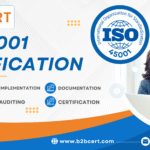If you’re in the waste management and recycling industry, you know just how crucial it is to operate efficiently and sustainably. You’re not only handling materials that require careful attention but also playing a major role in reducing environmental impact. But as environmental regulations get stricter and expectations from customers and stakeholders rise, it can feel like you’re constantly navigating a maze of compliance requirements.
This is where ISO 14001 certification comes into play. It’s not just another regulatory hoop to jump through; it’s a game-changer. If you’re looking for a way to elevate your operations, ensure environmental sustainability, and gain a competitive edge, ISO 14001 might be exactly what your waste management or recycling organization needs.
But what exactly is ISO 14001? And how can it benefit your organization, especially in an industry as complex and critical as waste management and recycling? Let’s break it down.
What Is ISO 14001 Certification?
ISO 14001 is the international standard for environmental management systems (EMS). The goal? To help organizations minimize their environmental impact while improving efficiency. For waste management and recycling businesses, this certification means adopting a structured framework that focuses on reducing waste, conserving resources, and continually improving your environmental performance.
The beauty of ISO 14001 is that it’s applicable to all types of organizations, regardless of size or industry. Whether you’re managing landfill sites, operating recycling plants, or collecting industrial waste, the principles of ISO 14001 can be applied to your operations. It’s about creating a system that helps you stay compliant with environmental regulations, improve resource usage, and reduce negative impacts on the planet.
In short, ISO 14001 isn’t just about compliance — it’s about doing your part for the environment and making your operations more efficient at the same time.
Why ISO 14001 Matters to Waste Management and Recycling Organizations
Waste management and recycling aren’t just about processing materials and keeping things clean. These industries are about sustainability, compliance, and managing waste in a way that benefits everyone — the planet, the community, and your business. ISO 14001 certification brings these elements into sharper focus, ensuring that your processes align with global environmental standards.
Let’s take a look at the real benefits of ISO 14001 certification for waste management and recycling businesses.
1. Reduced Environmental Impact
You probably already have environmental goals in place, but ISO 14001 helps take them to the next level. By implementing this standard, your organization commits to actively reducing waste, improving energy efficiency, and minimizing harmful emissions.
ISO 14001 helps you identify key areas where your operations impact the environment. It pushes you to find opportunities to reduce waste, water usage, and energy consumption, and even reduce your carbon footprint. For example, maybe you’ve been recycling materials at a certain rate, but after applying the standard, you realize there are opportunities to recycle more efficiently or process certain materials in a more eco-friendly way.
It’s all about getting smarter with your resources. The outcome? A measurable reduction in your environmental footprint. For a waste management business, that’s a huge win — not just for the planet but for your bottom line.
2. Increased Regulatory Compliance
Environmental regulations are constantly changing, and staying ahead of the game can be a full-time job. Non-compliance not only exposes you to fines but also damages your reputation in a competitive market. ISO 14001 certification helps your business maintain compliance with ever-evolving environmental laws.
The beauty of ISO 14001 is that it ensures your environmental management system is always up to date. By following the standard, you can stay ahead of regulatory changes and demonstrate to your clients and stakeholders that you are committed to following the law.
In essence, ISO 14001 is your organization’s roadmap to navigating the complex world of environmental regulations, ensuring that your operations are always on track and in line with the most current laws.
3. Cost Savings and Efficiency Gains
One of the biggest surprises for many companies that implement ISO 14001 is the significant cost savings that come with it. The standard encourages organizations to evaluate resource usage and identify areas for improvement. This often leads to better waste management practices, more efficient use of materials, and lower energy costs.
Take energy use, for example. If you haven’t already done so, optimizing your facility’s energy consumption can significantly reduce your utility bills. Whether it’s upgrading equipment, improving building insulation, or simply turning off machinery when it’s not in use, ISO 14001 helps you find ways to become more energy-efficient and save money.
And let’s not forget waste. ISO 14001 pushes you to think about your waste streams differently. Are there materials you can recycle instead of sending to the landfill? Can you repurpose certain items to reduce costs? Small changes add up, and by continuously improving your processes, you can significantly reduce waste disposal costs.
4. Improved Brand Reputation and Competitive Edge
Sustainability is more important than ever to consumers, businesses, and regulators alike. If you want your waste management or recycling business to stand out in a crowded market, ISO 14001 certification gives you a competitive advantage.
When you’re certified, you’re signaling to clients that you take environmental issues seriously and are committed to continuous improvement. For customers, this certification demonstrates that you meet globally recognized standards for environmental management. It also builds trust — and trust is a powerful tool for customer loyalty.
Moreover, being ISO 14001 certified can make your organization more attractive to potential partners. Many companies prefer working with suppliers and contractors who have a solid environmental management system in place, which is why having this certification can open doors to new business opportunities.
5. Employee Engagement and Morale Boost
ISO 14001 isn’t just about what you do for the planet; it’s about what you do for your people. When your employees know that you’re committed to environmental stewardship, it fosters a sense of pride in the work they do. Employees feel more connected to the company’s mission when they can see that their efforts are contributing to something bigger than just the day-to-day operations.
Implementing ISO 14001 also creates a more structured and efficient workplace. With clear procedures in place, your team is better equipped to carry out their tasks, which reduces confusion and enhances productivity. Plus, the standard encourages ongoing training and development, helping your staff stay engaged and informed about the latest environmental best practices.
6. Continuous Improvement and Risk Management
One of the cornerstones of ISO 14001 is the concept of continuous improvement. Once you’ve implemented the system, the process doesn’t stop. ISO 14001 encourages you to constantly evaluate and refine your environmental management strategies. This leads to better decision-making and greater innovation over time.
This focus on continual improvement also helps you identify and manage environmental risks. Whether it’s a potential hazard related to waste storage or a risk associated with water contamination, the standard helps you assess these risks and put proactive measures in place to avoid them. In an industry like waste management, where unforeseen issues can have significant impacts, ISO 14001 provides the tools to stay ahead of problems and mitigate risks before they arise.
The ISO 14001 Certification Process
Achieving ISO 14001 certification might sound daunting, but it’s a process that any waste management or recycling organization can tackle with the right approach. Here’s a step-by-step breakdown of how it works:
1. Initial Assessment and Planning
Before jumping into the certification process, it’s important to assess your current environmental management system. Identify where your operations stand in relation to ISO 14001 requirements and figure out what changes you’ll need to make. This is also the time to establish your environmental policy, set objectives, and define the scope of your EMS.
2. Develop and Implement the EMS
Once you’ve identified gaps, it’s time to build and implement your environmental management system. This might involve revising your current practices, creating new policies, and ensuring that all staff are on board with the changes. It’s also essential to establish clear roles and responsibilities within your organization for managing environmental performance.
3. Internal Audits and Reviews
Now, you’ll need to conduct internal audits to ensure that the EMS is working as intended. Internal audits are a critical part of the process, helping you identify any areas where the system isn’t functioning effectively.
4. External Certification Audit
Once your system is in place and operating effectively, it’s time for the external certification audit. This is typically done by an accredited certification body that will assess your organization’s compliance with ISO 14001. If all goes well, you’ll receive certification.
5. Ongoing Monitoring and Improvement
Remember, ISO 14001 is all about continuous improvement. After certification, your organization must continue monitoring and improving your environmental management practices. This might involve regular internal audits, annual reviews, and adapting to new regulations.
Wrapping Up: ISO 14001 — A Step Toward a Greener Future
ISO 14001 certification is a powerful tool for waste management and recycling organizations looking to reduce their environmental footprint, improve efficiency, and stay ahead of regulatory changes. It offers clear benefits, from cost savings to improved market competitiveness. More than that, it helps you make a real difference in the world by adopting sustainable practices and ensuring that environmental stewardship is at the core of your business.
So, if you’re looking to not only meet but exceed industry standards, ISO 14001 is the way forward. It’s not just about getting certified — it’s about creating a legacy of environmental responsibility that benefits your business, your community, and the planet.



